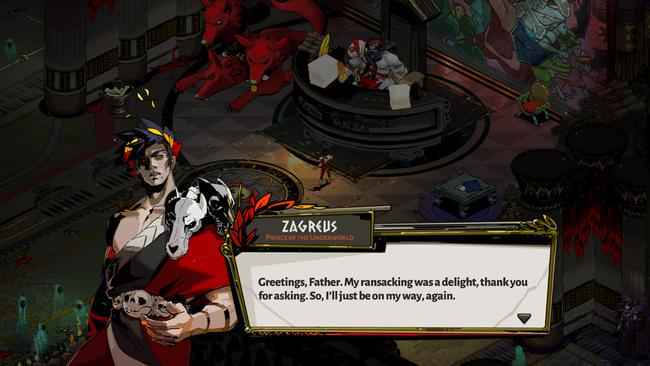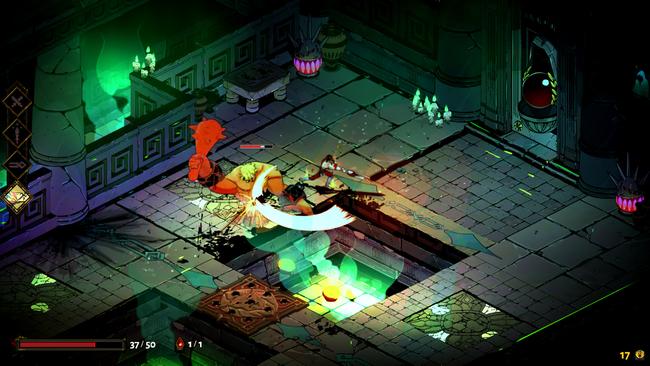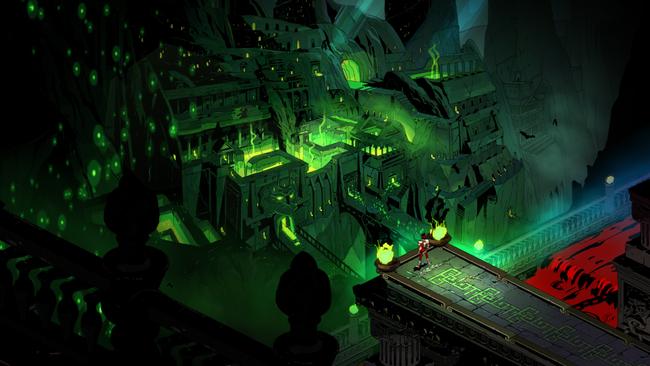
Hades Review
How do you make repeating the same areas and gameplay beats over and over again enjoyable? In the case of Hades, it combines stellar characters and world-building with satisfying combat and a progression system that keeps you hooked. It’s not only one of the best roguelite style games I’ve played this year, but one of the best I’ve ever played.
Hades puts you in the burning sandals of Zagreus, the son of Hades. Zagreus is attempting to escape the Underworld to find his mother above ground. Not to pile on the praise too early but the characters and world of Hades are easily one of the strongest I’ve seen in the genre. Zagreus is immediately likeable as a protagonist and all of the rest of the cast are incredibly well-portrayed. The Gods in particular really stand out, and there is a clear reverence for Greek mythology at play here. I loved that Hades could have just been shown as a massive dictator but is instead given quite a lot of depth and sympathy. You really get to see both the good and bad of these flawed-yet-divine characters. It just feels like an incredibly honest portrayal.
It’s important that the characters are so likeable here because one of the main tricks of Hades is how it combines its roguelike nature with its story-telling. Every time you die (and you will die a lot) you’re also getting the chance for new dialogue. Hypnos will react to whatever killed you, Hades will continue to chastise your escape attempts and Achilles will offer you advice on what to do next. It’s amazing just how much it feels like your relationships to each character is developing, and when you combine that with a relationship-measuring affinity meter that can be raised by giving gifts, there’s a lot of fun and depth to talking to the characters around you. That's one of Hades' biggest strengths - it makes both death and victory equally enjoyable.

In so many roguelikes the reward is victory and loot but in Hades a lot of the reward is simply experiencing more of the game’s story and characters. It’s almost tempting to let enemies take you down just so you can try and coax a secret out of Skelly or build a relationship with Thanatos. These triumphs in story and character are accompanied by some fantastic presentation values. Much has been made on the internet of how attractive all of the characters are and whilst that’s totally true it’s also indicative of how great the visuals are here, both inside and outside of the core conceit of trying to escape the underworld. Just as surprising is the soundtrack that combines light metal riffs and somber piano tracks for a really well-realised atmosphere.
All of this would mean a lot less if Hades wasn’t fun to play, but I’m very happy to say that isn’t the case. The experience of playing Hades deserves practically equal praise to its narrative, something which is remarkable considering the quality of its story. The general gameplay loop of Hades has you going from room to room taking on a number of enemies and challenges, before facing a boss and moving to a more difficult location. You get to choose what reward you pick from beating each room and although some things stay the same throughout, the order of rooms and the items offered are randomised to make every run feel unique.
Combat feels incredibly satisfying no matter which of the six weapons you’re using at the time. Each has unique moves that make learning them really fun and even without all the modifications you can apply combat is crunchy and fun with just enough strategy and depth to keep things interesting. The variety that comes from each weapon is the standout, and I was surprised at just how much fun I had trying to beat the final boss with each of the weapons at least once. The real fun twist and the thing that really makes this a roguelike comes from all of the ways you can modify Zagreus’ moveset in an escape attempt.

Each time you clear a room of enemies, you’re presented with a variety of different rewards, ranging from currencies for buying items or upgrading Zagreus, to special items that can change how his weapon works. The most exciting of them are the boons, which are perks offered from the Gods that can seriously change up how you play. Each God gives different boons and they all affect your attacks and stats differently depending on the rarity of the boon. Sometimes it’s as simple as imbuing your attack with an element, while other times it offers a whole new move to add to your arsenal. Even better is the fact that each of these boons has Zagreus interacting with whichever God offered up the upgrade, which feels like another perfect melding of roguelike reward and well-written story content.
There plenty of different boons, but there's also unique situations regarding how Zagreus receives them. Sometimes two Gods will show up and make you choose between them and sometimes they’ll offer a combined boon that does extra damage. The illusion of these boons being exciting events never faded for me and they managed to keep the gameplay fresh even dozens of runs in. What also managed to keep things fresh were the unique and random ways that each run can be changed up. Sometimes it’s as simple as getting the chance to earn more coins and sometimes it’s as unique as a whole new boss showing up at the end of one of the worlds. Even after a lot of hours put into Hades, I still feel like I’m constantly seeing new things and progressing.
In fact, one of my favourite elements of Hades is its progression systems. There are temporary ones that only exist in each run that come from the boons you pick and the stats you can boost as well as the more permanent upgrades that you can apply to Zagreus and his weapons. Being able to permanently improve stats after each run feels really rewarding and ultimately makes the difference between perishing mid-run and actually beating the game. It's still never easy but there are definitely ways to make the challenges thrown at you more manageable. Even the social and story elements I mentioned earlier are their own progression system as each conversation adds to a codex and each character has their own unique items to give you. The main gameplay loop of Hades is satisfying enough to warrant replayability but there really is a lot for players to do here.

There are occasions when you play a game and there’s pretty much nothing about it that doesn’t gel with you. For me Hades is one of those moments, but if I had to nitpick then I’d say that there are times when it can feel a little bit repetitive in its environments and enemies. There are a lot of different variations for every run and the seemingly-unlimited number of boons definitely help keep things interesting but there are times when I wished there were a few more distinct areas to throw into the mix.
This repetition can also lead to a general feeling of grindiness. Hades mostly feels really rewarding with its progression but there are some times when seeing the long list of optional decorations for gemstones can make me sigh a little bit. Even then, I’d argue that all of that content is really for the fans who intend to stick with it all the way, which is something I’d very much like to do.
For me Hades represents one of those magical moments where a game takes you completely by surprise. For a long time Hades wasn’t even on my radar despite the pedigree of its developers - but now it’s easily standing as one of my games of the year and something I consider absolutely essential for fans of the roguelike genre, Greek mythology, emergent storytelling or all of the above.